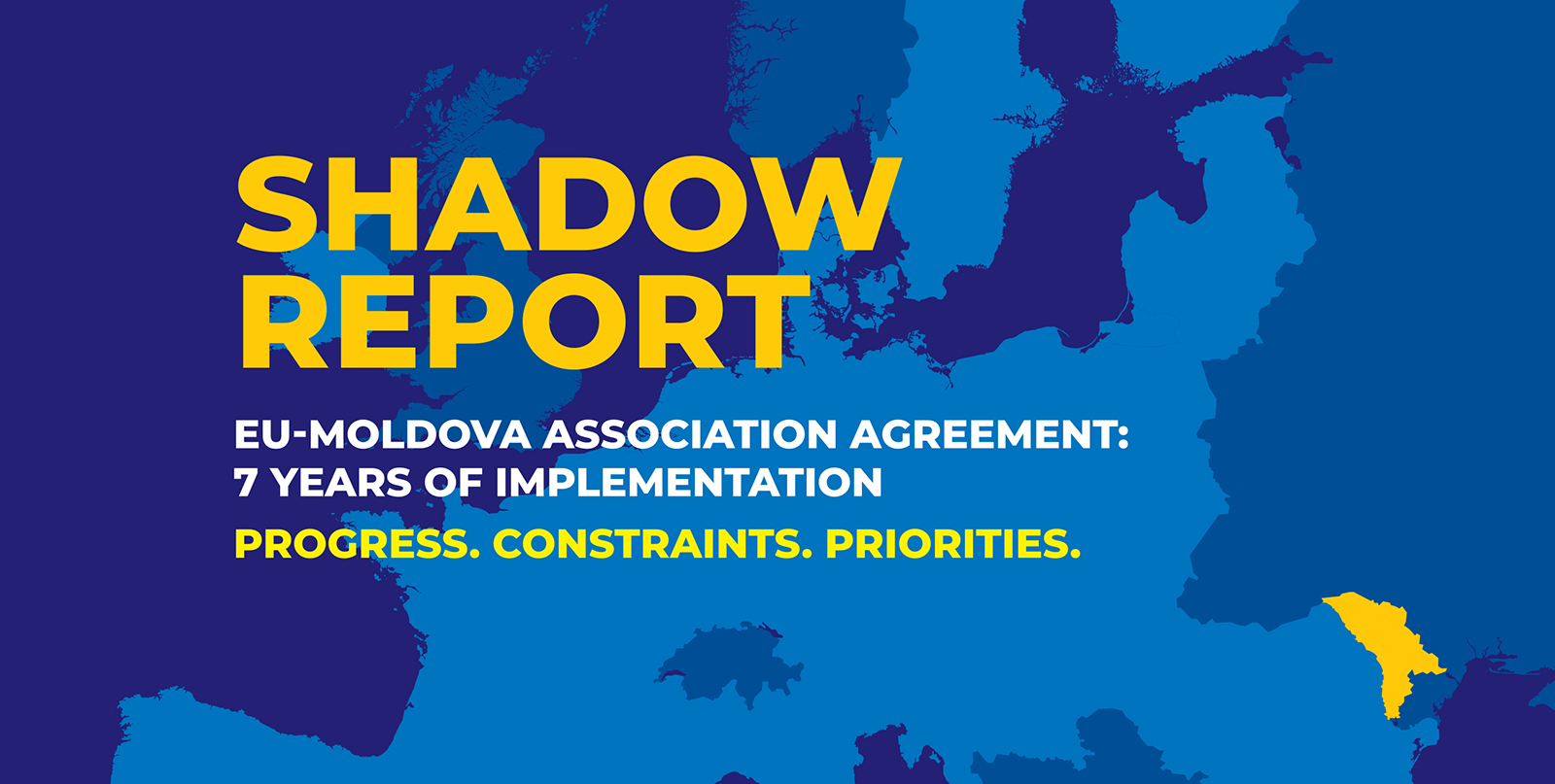IPRE’s Shadow Report: Seven years of the EU-Moldova Association Agreement implementation – Progress, Constraints and Priorities

During the seventh year of implementation of the Association Agreement (1 September 2020 – 1 September 2021), while summarizing the results and constraints identified in this Shadow Report, there is higher qualitative progress in those areas and sectors covered by the EU-Moldova Association Agreement, which have been conditioned on the budget support and macro-financial assistance programs provided by the EU. In 2021, citizens’ trust in the European Union has increased. Over 57% of the citizens of the Republic of Moldova opt for the accession of the Republic of Moldova to the European Union.
These are on the main findings of the new Shadow Report „Seven years of the EU-Moldova Association Agreement implementation – Progress, Constraints and Priorities”, presented today, by the Institute for European Policies and Reforms (IPRE), in partnership with the National Platform of the Eastern Partnership Civil Society Forum and with the support of the Konrad Adenauer Foundation in the Republica Moldova.
According to IPRE’s analysts, The European Union remains the main development partner of the Republic of Moldova, offering in 2020 over EUR 360 million under various assistance programs, including regional programs EU4Business, EU4Energy, EU4Environment, EU4Youth, EU4Digital. In 2020 EU provided in the framework of the Team Europe initiative over EUR 127 million to support the management of the COVID-19 pandemic crisis and its effects. During 2021, the European Commission alone offered the Republic of Moldova over EUR 150 million, including over EUR 100 million within the budget support programs and 50 mln. EUR – last tranche of OMNIBUS macro-financial assistance. Moreover, in 2021, the EU launched a special Economic Recovery Plan for the Republic of Moldova for the years 2021-2024 of EUR 600 million, focused on five pillars, namely (1) public finance management and economic governance; (2) competitive economy, trade and SMEs; (3) infrastructure; (4) education and employment in the labor market; and (5) the reform of the rule of law and justice. Moldova continued to benefit from TWINNING, TAIEX, and the expertise of EU High Level Advisers. The mandate of the EUBAM Mission was extended until November 30, 2023. The EU also increased the volume of assistance by EUR 5 million for the fifth stage of the EU Confidence Building Program. On October 28, 2021, the Republic of Moldova joined the EU Research and Innovation Program for 2021-2027 – Horizon Europe.
In addition, in the context of the new objectives of the Eastern Partnership post-2020, in the context of the Eastern Partnership Summit of December 2021, the Regional Indicative Plan for 2021-2027 is finalized, which will support the implementation of the EU Economic and Investments Eastern Partnership Regional Plan (with an EU contribution of EUR 2.3 billion). Within this regional program, the EU will implement in the Republic of Moldova five flagship initiatives (1) in the field of sustainable economy will be assisted over 50,000 SMEs, (2) construction of a freight terminal to stimulate trade with the EU; (3) increase energy efficiency, (4) construction of transport infrastructure for anchoring Moldova to TEN-T and (5) modernization of school infrastructure and implementation of the national strategy in the field of education.
IPRE considers that the EU-Moldova political dialogue was influenced by the changes in the internal politics in Chisinau, especially following the election of Maia Sandu as President of the Republic of Moldova and the early parliamentary elections of July 11, 2021, but also by the evolution of the COVID-19 pandemic crisis. Additionally, on the eve of the Eastern Partnership Summit in December 2021, the Republic of Moldova, Georgia and Ukraine formalized the Associated Trio initiative. During its sixth meeting of the EU-Moldova Association Council, the European aspirations and the European choice of the Republic of Moldova were recognized, by reaffirming the common commitment to strengthen political association and deepen economic integration in accordance with the Association Agreement. The new Association Agenda is to be finalized by the end of 2021. However, the main constraint by mid-2021 was the political instability that affected the efficiency of national authorities in implementing the provisions of the EU-Moldova Association Agreement. One of the priorities at national level remains the adoption of the new Action Plan on the implementation of the Association Agreement.
The European Union continues to be the main economic trading partner of the Republic of Moldova, capitalizing on the Deep and Comprehensive Free Trade Area with the EU. About 65% of exports are oriented to the EU market, while about half of the imported products and services of the Republic of Moldova are from EU countries. Romania, Germany and Italy are the main EU countries of destination for Moldovan exports. Although there is a transposition rate of approximately 65-70% of the EU acquis under the Association Agreement (approximately 500 of the more than 680 EU directives and regulations are fully or partially transposed) into the national legislation. The main challenge still remains to implement the transposed legislation in particular in the field of transport, environment, implementation of sanitary and phytosanitary measures. One of the priorities for the next period remains the conclusion of an Agreement with the EU on conformity assessment and acceptance of industrial products (ACAA).
The EU-Moldova cooperation in the anti-fraud field continued based on cooperation agreements between NAC, Customs Service and the Court of Accounts with the European Anti-Fraud Office (OLAF). The Republic of Moldova needs to expand its strategic and operational cooperation in the field of anti-fraud and anti-corruption with the European Public Prosecutor’s Office (EPPO). NIA’s activity was strengthened compared to the previous year. The Parliament has extended the powers of integrity inspectors, extended the scope of control to affiliates in the event of justified suspicion, and those subject to declaration will be required to declare the market value of assets. CARA’s work needs to be further improved, including through the adoption of a Criminal Assets Recovery Strategy.
Further efforts are needed in the field of international cooperation in criminal matters and the recovery of assets, which are abroad, including the creation of joint investigation teams (JITs), secondment of prosecutors to the EUROJUST Office, creation of a national task force in the field of asset recovery. International efforts are also required at the level of the USA, EU and other partner countries of the Republic of Moldova to activate restrictive measures and sanctions against fugitive kleptocrats, and their affiliates involved in financial frauds, money laundering, human rights violations.
For more details, please read the Shadow Report in English here and Romanian here.
The video recording of the public event for the presentation of the Shadow Report can be watched here.
The IPRE Shadow report was prepared within the IPRE Project “Monitoring the implementation of the Association Agreement between the Republic of Moldova and the European Union”, implemented with support of the Konrad Adenauer Foundation (KAS).

















